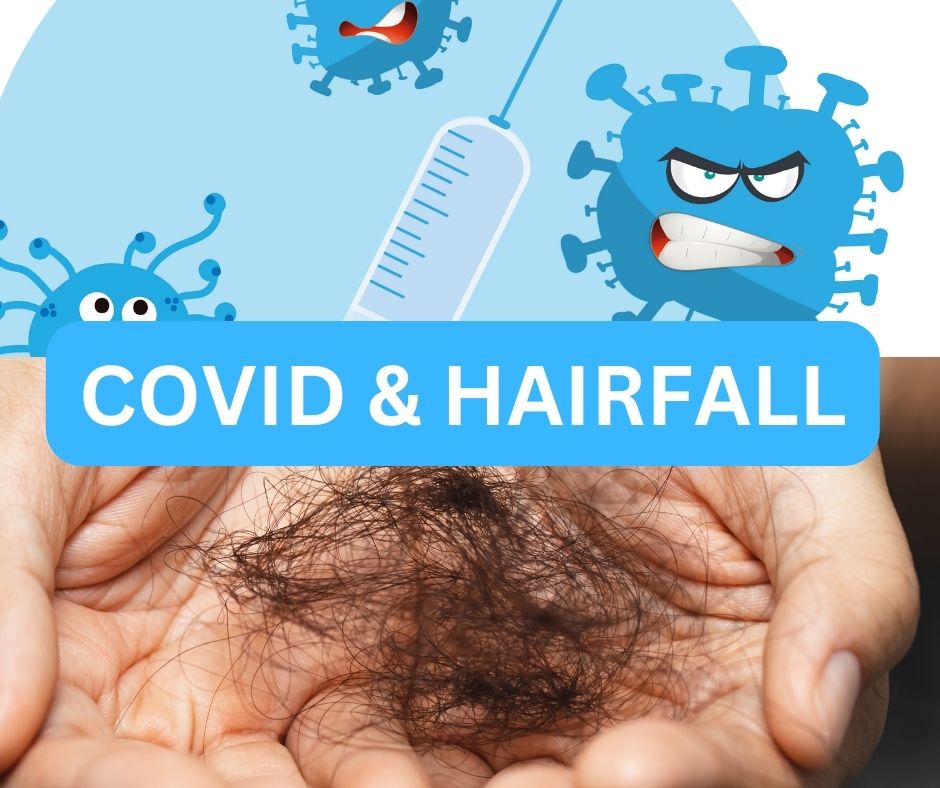Hair loss, also known as alopecia, is a common side effect of viral infections such as COVID-19. The condition can be distressing for those who experience it, and understanding the underlying causes and potential treatment options can help to alleviate some of the emotional distress associated with hair loss. In this article, we will explore the scientific reasons for hair loss after viral infections and discuss some of the most effective treatment options currently available.
Causes of Hair Loss after Viral Infections

The exact mechanisms by which viral infections cause hair loss are not yet fully understood. However, there are several theories that have been proposed to explain the phenomenon.
One theory is that viral infections can cause inflammation and stress on the body, which can disrupt the normal hair growth cycle. This disruption can cause hair to fall out prematurely, resulting in hair loss.
Another theory is that certain medications used to treat viral infections can cause hair loss as a side effect. These medications can cause changes to the hair follicles, which can lead to hair loss.
It’s important to note that hair loss caused by medications is typically temporary and the hair growth will return to normal once the medication is discontinued.
Viral infections can cause hair loss in a number of ways. Some viruses, such as the varicella-zoster virus (which causes chickenpox and shingles), can cause a condition called “alopecia areata.” This is an autoimmune disorder that causes hair loss on the scalp and other areas of the body.
Another way that viral infections can cause hair loss is through a condition called “telogen effluvium.” This occurs when a significant number of hair follicles enter the telogen (resting) phase at the same time, resulting in excessive hair shedding. This can be triggered by a variety of factors, including viral infections, hormonal changes, and physical or emotional stress.
Lastly, some researchers suggest that there might be a genetic basis for hair loss after viral infections. This means that some people might have a genetic predisposition to hair loss, which may be triggered by viral infections.
Ayurvedic and Natural Therapies for Hair Loss After Viral Infections

Ayurvedic remedies for hair loss include the use of herbal oils, such as coconut oil or amla oil, massaged onto the scalp. These oils are thought to nourish the hair follicles and promote hair growth.
Ayurvedic herbs such as bhringraj, amla, and neem, are also believed to be effective in treating hair loss. These herbs can be taken as supplements, applied topically as a paste, or used in hair oils.
Another Ayurvedic approach is panchakarma, a cleansing and rejuvenation therapy, which can help to remove toxins from the body and balance the doshas, or energies, in the body. This can improve overall health and help to promote hair growth.
Natural therapies for hair loss include the use of essential oils, such as rosemary and lavender oil, massaged into the scalp. These oils are believed to stimulate blood flow to the hair follicles and promote hair growth. A balanced diet, rich in protein and vitamins, is also important for maintaining healthy hair.
A healthy diet can play an important role in promoting hair growth and preventing hair loss. The following foods are known to be beneficial for hair health:
5 Fruits for Hair Health: Boosting Hair Growth and Reducing Hair Fall”
A healthy diet can play an important role in promoting hair growth and preventing hair loss. The following foods are known to be beneficial for hair health:

- Avocado -High in vitamins and minerals that promote hair growth
- Blueberries
- Rich in antioxidants that protect hair from damage
- Oranges
- High in Vitamin C that helps in producing collagen, which is important for hair growth.
- Papaya
- Contains enzymes that promote hair growth
- Strawberries
- Rich in Vitamin C and folate, which promote hair growth and prevent hair fall
It’s important to note that hair loss can be caused by multiple factors, including genetics, hormonal changes, and certain medical conditions.
If you are experiencing hair loss, it’s important to consult with a medical professional to determine the underlying cause and the best course of treatment. A healthy diet can be a good complement to medical treatment but it should not be the only solution.
In addition, hair loss can also be caused by nutrient deficiencies. It is important to have a balanced diet that covers all the necessary vitamins, minerals and macronutrients. This can be achieved by consuming a variety of fruits, vegetables, lean protein and whole grains. A dietitian or nutritionist can help you with that.
“Say Goodbye to Hair Loss with Homoeopathy: A Holistic Solution”

- Homoeopathy is a holistic system of medicine that aims to treat the individual as a whole, rather than just the symptom.
- Homoeopathic remedies for hair loss are chosen based on the individual’s unique symptoms and constitution.
- Some of the commonly used remedies for hair loss include:
- Silicea: for hair loss that is accompanied by dry, brittle hair
- Lycopodium: for hair loss that is accompanied by dry, itchy scalp
- Phosphorus: for hair loss that is accompanied by weak and thinning hair
- Kalium carbonicum: for hair loss that is accompanied by a dry, itchy scalp and dandruff
- Natrum muriaticum: for hair loss that is accompanied by a dry, itchy scalp and dandruff
Consulting a Homoeopath
It is important to consult a qualified and experienced homoeopath for the proper diagnosis and treatment of hair loss. The homoeopath will take a detailed case history, including information about the individual’s physical, emotional and mental symptoms, as well as their past medical history.
Based on this information, the homoeopath will select the appropriate remedy for the individual’s unique case.
Medical Treatments for Hair Loss: Understanding the Options
The treatment options for hair loss after viral infections will depend on the underlying cause of the hair loss. Here are some of the most effective treatment options currently available:
- Medications: If the hair loss is caused by a medication, the first step is to discontinue the medication if possible. If the medication cannot be discontinued, a different medication may be prescribed to help with the hair loss.
- Minoxidil: Minoxidil is a medication that is applied to the scalp and is known to be effective in promoting hair growth. It is available over the counter and by prescription.
- Finasteride: Finasteride is a medication that is taken orally and is known to be effective in promoting hair growth. It is available by prescription only.
- Hair growth supplements: There are various supplements available that are known to promote hair growth. These supplements typically contain vitamins, minerals, and other nutrients that are essential for healthy hair growth.
- Hair restoration surgery: Hair restoration surgery, such as hair transplants, can be an option for those who experience severe hair loss. This procedure involves transplanting hair follicles from one area of the scalp to another.
Conclusion
Hair loss is a common side effect of viral infections, such as COVID-19. Understanding the underlying causes of hair loss can help to alleviate some of the emotional distress associated with the condition. There are several treatment options available, such as medications, minoxidil, finasteride, hair growth supplements, and hair restoration surgery.
The best treatment option will depend on the underlying cause of the hair loss, so it is important to consult with a medical professional. Remember, in most cases hair loss is temporary and hair growth will return to normal once the underlying condition has been treated.








